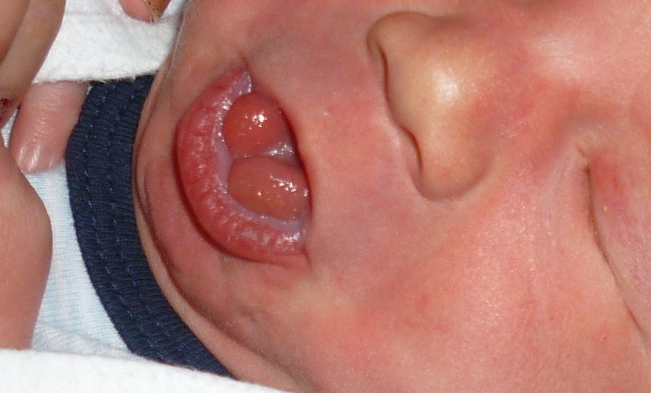Unravelling the tongue-tie information tangle.
Many parents have encountered conflicting information and advice on the topic of infant tongue tie, particularly in relation to breastfeeding. While some health practitioners regard the presence of a visible frenulum under a baby’s tongue as unimportant, others identify it as a potential cause of a myriad of present and future physical problems.
Evidence confirms simple scissor frenotomy is likely to benefit the small proportion of infants with tongue tie (around 8% of babies worldwide) particularly in response to breastfeeding problems. Restrictive tongue-ties which are affecting feeding are treated by trained clinicians who cut the membrane under the tongue with surgical scissors, releasing it to move freely.
One of Australia’s leading clinicians and breastfeeding researchers Associate Professor Lisa Amir of LaTrobe University advises “There is both under-diagnosis and over-diagnosis. Infants need to use their tongue to attach to the breast deeply and feed well. If baby’s tongue is restricted this can be difficult for the mother contributing to nipple pain and damage, and the infant may struggle with feeding and have poor weight gains. Where the frenulum extends to the tip of the tongue, or near the tip, and restricts the infant being able to attach to the breast – there is evidence that a simple scissor release of the frenulum is useful in helping mothers continue to breastfeed.”
An International Board Certified Lactation Consultant (IBCLC) is qualified to assist mothers with breastfeeding problems, which are multifactorial. Each mother and baby breastfeeding partnership presents a unique combination of shape, size and function variables. The baby’s tongue should be carefully assessed, and treated if deemed necessary, but is only one piece of the gloriously diverse mother/baby breastfeeding puzzle.
Dr Amir also states “Posterior tongue-tie is being blamed for a wide range of issues such as gassy baby, noisy feeding, and potential problems in the future, without evidence, and the current concern about upper lip-tie is completely unwarranted. The frenulum under the top lip changes naturally over time and does not play a large part in breastfeeding.” Dr Amir warns “In particular, be wary of clinicians who frequently cross-refer to their “Preferred Providers” for extensive “body work” before and after frenotomy, without any evidence this is necessary.”
Dr Vishal Kapoor is lecturer in Children’s Health at The University of Queensland and lead author of the study which revealed a 420% increase in the incidence of frenotomy (tongue-tie surgery) in children. Dr Kapoor says “as well as a lack of proper support for breastfeeding mothers, and the influence of social media and parenting blogs and forums on the internet, there is a mushrooming industry around providing tongue-tie surgeries, particularly among dentists… Worryingly, some parents are being instructed to massage the area around the wound site(s) after laser surgeries, which can be painful for babies and cause even more issues through oral aversion.” There is no evidence to support these “wound stretches” which are recommended to be performed in the infant’s mouth several times a day, for a sequence of weeks. In fact, a large study in 2022 confirmed that “active wound management” following a frenotomy is of no benefit and is potentially harmful.
Assoc Prof Amir agrees the diagnosis of infant tongue tie by chiropractors and osteopaths has become common-place, and their subsequent referral to particular dentists who perform frenotomy using lasers has become a big business, promoted widely via social media.
Laser infant frenotomy treatments by dentists are not accounted for on any public data base or via Medicare, and fees for laser surgery in infants’ mouths usually exceed $1000. In contrast, the fee for infant frenotomy performed by a medically qualified tongue tie clinician is usually under $400, is performed in a matter of seconds (not minutes like laser release), bleeding is minimal and babies feed immediately after the procedure.
Author: Lois Wattis conducts a weekly Tongue Tie Clinic in collaboration with Dr David McIntosh, Paed ENT at Maroochydore Qld.
Visit www.birthjourney.com for more details.
References: http://adc.bmj.com/content/early/2014/11/07/archdischild-2014-306211
Bhandarkar KP, Dar T, Karia L, Upadhyaya M. Post Frenotomy Massage for Ankyloglossia in Infants-Does It Improve Breastfeeding and Reduce Recurrence? Matern Child Health J. 2022 Aug;26(8):1727-1731. doi: 10.1007/s10995-022-03454-x. Epub 2022 Jun 18. PMID: 35716239.


